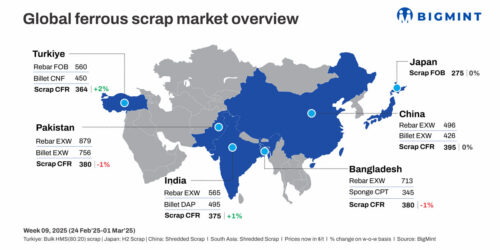
Global ferrous scrap offers showed mix trend this week, with Turkiye’s prices rising 2% to $364/t CFR amid tight supply. South Asia saw limited trade ahead of Ramadan, while Bangladesh and Pakistan faced sluggish demand. Japan’s H2 scrap held firm, Vietnam saw cautious buying, and US scrap prices rose $6/t w-o-w, driven by domestic demand.
Turkiye: Turkiye’s imported scrap market strengthened, with UK-origin shredded prices rising 2% to $364/t CFR from $358/t. Despite sluggish rebar sales, mills continued restocking amid firm seller expectations and tight supply. European and US recyclers held prices firm due to currency strength and strong domestic demand.
US-origin offers reached $364/t CFR, while EU-origin deals were at $359-363/t CFR. Mills hesitated on higher prices, keeping the scrap-to-rebar spread tight at $196/t. However, expectations of rising US scrap prices in March added pressure. While Baltic sellers showed slight flexibility, overall supply constraints limited price drops, keeping sentiment cautious.
India: India’s imported scrap market edged up by 1% this week, with UK/Europe-origin shredded prices reaching $375/t CFR Nhava Sheva, up from $373/t the previous week. Despite weak demand, tight liquidity, and a widening bid-offer gap, sellers managed to push prices slightly higher amid rising Turkish scrap prices and improved rebar demand. However, buyers remained hesitant due to sufficient domestic scrap availability and currency depreciation.
US-origin scrap trade remained slow, with no firm offers and limited demand for 40-ft containers. Bulk shipments faced 60-70 day delays, discouraging purchases. Buyers focused on clearing port inventories, while demand uncertainty, US tariff changes, and Turkish scrap trends will shape market direction post-March.
Approximately 11,000-12,000 t of scrap was booked, including 7,000-8,000 t of HMS (80:20) from the UK, Poland, Venezuela, Europe, and Australia at $340-365/t. Additionally, 1,000-1,500 t of shredded scrap from the UK traded at $375/t, while 1,500-2,000 t of PNS scrap from Poland and the EU was secured at $370-375/t. The remaining volumes consisted of turning scrap, busheling, and other scrap types.
Pakistan: Pakistan’s imported scrap market weakened, with UK/Europe-origin shredded prices falling 1% to $380/t CFR Qasim from $383/t last week. Buyers stayed cautious ahead of Ramadan, as weak liquidity and sluggish steel demand kept trade slow. Suppliers initially quoted higher but later lowered offers due to limited interest.
UAE-origin scrap saw some demand due to shorter transit, while domestic scrap stood at PKR 140,000-145,000/t ($501-519/t) exw. Karachi mills operated at 40-50% capacity, relying on credit-based sales.
Market sentiment remained bearish, with expectations of further slowdown as Ramadan nears. While electricity tariff cuts provided some relief, mills continued to face cash flow issues, making them hesitant to book high-priced imports. Buyers kept bids low at $375-380/t CFR, limiting deal closures.
Bangladesh: Bangladesh’s imported scrap market remained weak, with UK-origin shredded falling 1% to $380/t CFR Chattogram. Weak steel demand, high inventories, and stalled projects kept buyers cautious, while Ramadan further slowed procurement. A $10/t bid-offer gap restricted deals.
Domestic scrap rose to BDT 56,000-58,000/t ($461-477/t) due to LC issues, pushing mills toward local supply. Rebar prices stood at BDT 85,000-86,000/t ($700-708/t) in Chattogram and BDT 82,000-83,500/t ($675-687/t) in Dhaka, with sluggish sales.
Some mills made selective purchases, but bulk demand remained low amid high freight costs, a meaningful recovery remains uncertain amid sluggish steel sales and a lack of new government project activity.
Japan: H2 scrap export market remained stable as sellers held firm amid a stronger JPY, improved Chinese sentiment, and rising Turkish scrap prices.
Deep-sea prices climbed on strong US steel demand, keeping buyers cautious. BigMint assessed H2 export offers steady at JPY 41,500/t ($276/t) FOB Tokyo Bay, while domestic FAS prices rose to JPY 39,500-40,500/t ($263-269/t).
Vietnam: Vietnam’s imported scrap market saw limited activity as buyers remained cautious amid rising offers and exchange rate fluctuations. Japanese H2 scrap offers rose to $325-330/t CFR, with trades at $317-320/t CFR. Deep-sea scrap saw a bid-offer gap, while rising domestic prices prompted some mills to consider restocking.
US: US ferrous scrap export offers rose by $6/t w-o-w, driven by firm domestic demand expectations. Sellers raised prices for Turkiye and Asian markets, despite sluggish Turkish rebar sales. Mills continued restocking, facing resistance from US suppliers holding firm on higher prices. Meanwhile, European scrap remained available below $360/t CFR, creating a price gap that limited sharp price increases.
Taiwan: Taiwan’s imported scrap market stabilized as global prices leveled out, with mini-mills adopting a wait-and-see approach. Feng Hsin Steel kept rebar at TWD 18,200/t ($555/t) exw. US HMS 1&2 80:20 stayed at $313/t CFR, while Japan’s H2 scrap held at $320/t CFR.
